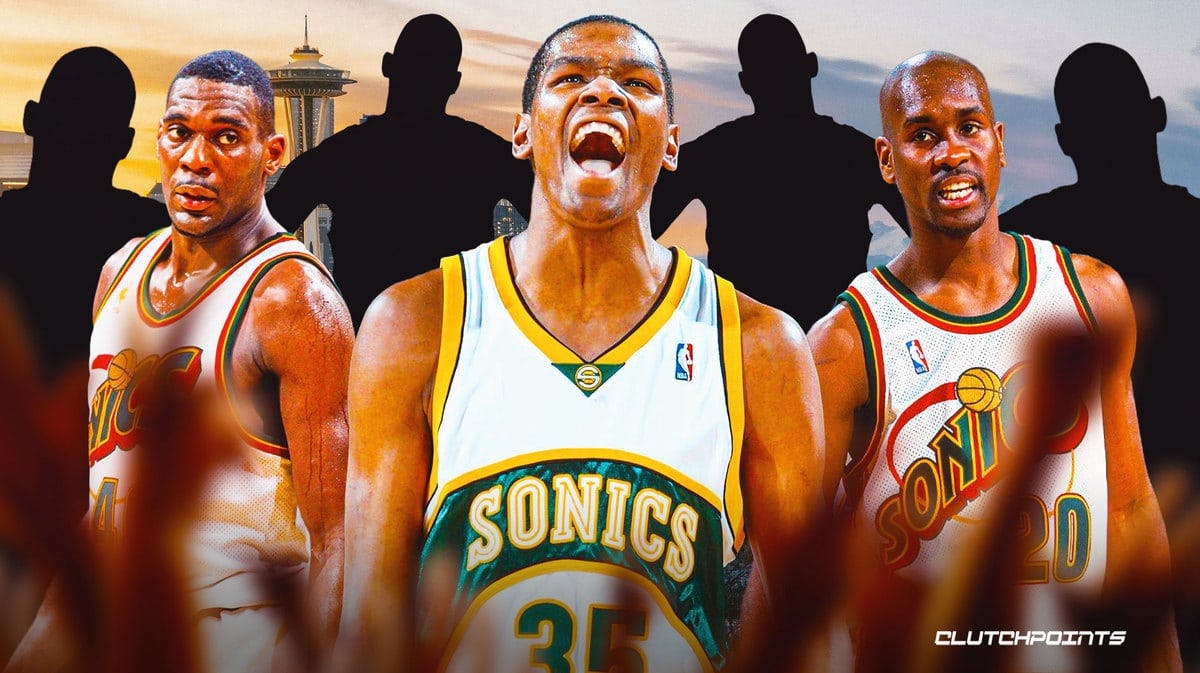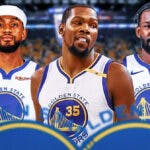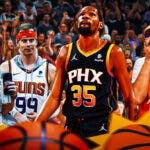It's a shame that, at this moment, the Seattle SuperSonics only truly exist in the minds and hearts of basketball fans. One of the most popular NBA franchises of all-time, the SuperSonics were established in 1967 as an expansion franchise and played their home games at the Seattle Center Coliseum, later renamed the KeyArena.
Throughout their history, the Sonics had several successful seasons, winning their first and only NBA championship in 1979 while led by stars like Dennis Johnson, Gus Williams, and Jack Sikma. The team also appeared in the NBA Finals in 1978 (against the Washington Bullets) and 1996 (against the Chicago Bulls).
Their on-court success and a passionate fan base aside, former team owner Clay Bennett expressed a desire to have a new, state-of-the-art arena to replace their aging arena. However, after failing to secure a new arena deal in Seattle, Bennett moved the franchise to Oklahoma City in 2008 where they would become the Oklahoma City Thunder.
The relocation decision was met with widespread disappointment and anger from Seattle basketball fans, who felt the move was unjustified. Fortunately, as the city of Seattle has retained the rights to the “SuperSonics” name and team colors, it's possible for a future NBA team to adopt the same name should the league decide to return to Seattle.
1) Gary Payton
Gary Payton, commonly known as “The Glove,” is widely regarded as one of the greatest point guards in NBA history.
Selected with the 2nd overall pick in the 1990 NBA Draft by the Seattle SuperSonics, made a name for himself as one of the best defensive players in the league early on, leading the Sonics in steals per game (2.0) and total steals (165) in his rookie season. Leading the entire league in steals outright in 1995-96 on his way to winning the Defensive Player of the Year award, Payton's defensive prowess would earn him nine All-Defensive Team selections throughout his career.
Though known primarily for his defense, Payton was also a highly skilled offensive player who excelled as a facilitator, scorer, and clutch shot-maker. Played for Seattle for the first 13-plus seasons of his career, Payton left the SuperSonics as the all-time leader in points, assists, steals, and games played.
Payton's infamous intensity — namely his fiery personality and love for trash-talk — not only made him a fan favorite during his playing days but after. In 2013, Gary Payton was inducted into the Naismith Memorial Basketball Hall of Fame, solidifying his status as one of the all-time greats in basketball history.
2) Shawn Kemp
The high-flying Shawn Kemp was selected by the Seattle SuperSonics as the 17th overall pick in the 1989 NBA Draft. After a disquieting but brief collegiate career, Kemp quickly quelled any concerns about his potential impact by proving himself to be one of the most electrifying young players in the NBA. It didn't hurt with teammate Gary Payton, drafted just a year after him, the Sonics would form a truly formidable duo.
During his time with the SuperSonics, Kemp earned five NBA All-Star selections and three All-NBA selections. He was a vital part of the Sonics team that reached the NBA Finals in the 1995-1996 season, averaging 20.9 points, 10.4 rebounds and 2.0 blocks per game in the 1996 NBA Playoffs. Seattle faced the Michael Jordan and the Chicago Bulls in that infamous matchup, losing the series in six games while Kemp averaged team-highs of 23.3 points, 10.0 rebounds and 2.0 blocks per game.
Kemp is remembered as one of the most dynamic and entertaining players of his era, particularly with his dominance in the paint. In fact, his ability to finish above the rim was beloved, he was a four-time NBA Slam Dunk Contest participant in his first five seasons.
Kemp ranks second in franchise history in career rebounds and blocks, while ranking in the top-10 in Sonics history in career points.
3) Jack Sikma
Jack Sikma, he of the infamous bleach blonde visage, was selected with the No. 8 pick in the 1977 NBA Draft by the Seattle SuperSonics.
One of the best centers of his era due to his versatility and skill set, at 6-foot-11, Sikma proved himself to be not only agile and a skilled playmaker but with an impressive scoring repertoire. A dominant presence in the post, Sikma was also an outstanding shooter, capable of hitting jumpers out to 3-point range in an era when most centers did the bulk of their dirty work down low.
Sikma played for Seattle for nine seasons and was key in their ability to win the 1979 NBA Championship against the Washington Bullets (now the Washington Wizards). Though it was just his second career season, Sikma averaged 14.8 points, 11.7 rebounds, 2.5 assists and 1.4 blocks per game in the 1979 NBA Playoffs. In the 1979 NBA Finals, Sikma averaged 15.8 points, 14.8 rebounds and 3.2 blocks per game while facing a Hall of Fame frontcourt of Bob Dandridge, Elvin Hayes and Wes Unseld.
During his time with the SuperSonics, Sikma was a seven-time NBA All-Star and finished in the top-10 of MVP voting twice (1979 and 1982).
Sikma ranks among the top-five players in Sonics history in career points, the top-10 in career assists, and the top-three in blocks. He is their all-time leader in total rebounds.
4) Ray Allen
Renowned sharpshooter Ray Allen began his storied basketball career in Dalzell, SC with Hillcrest High School. On his path from high school standout to college All-American to NBA All-Star, Allen was selected fifth overall in the 1996 NBA Draft out of UConn, establishing himself as a potent wing threat with the Milwaukee Bucks. Though even in those days he was known as a lethal 3-point shooter, in his early days and in his prime, Allen could be found scoring from anywhere on the court.
In Feb. 2003, Allen was traded to the Seattle SuperSonics in the very deal that ended franchise legend Gary Payton's tenure there. After signing a five-year, $85 million contract extension with Seattle in 2005, he continued to excel, setting the record for the most 3-pointers made in a single season with 269 in the 2005-06 season. Though the record would later be broken by Golden State Warriors guard Stephen Curry, Allen still ranks in the top-5 in Sonics history in 3-point field goals and has the fifth-highest scoring average (24.6 points per game) in franchise history as well.
Allen's legacy in the NBA revolves around his 3-point proficiency, work ethic, consistency, and clutch performances. He also played one of the most enduringly popular fictional sports characters (Jesus Shuttlesworth) in the film “He Got Game,” in which award-winning actor Denzel Washington was cast as his wayward father.
5) Spencer Haywood
In the 1971, future Hall of Fame center Spencer Haywood made an unprecedented move by declaring for the NBA Draft after just two years of college, the first a stint at Trinidad State Junior College in Colorado and the second a stint with the University of Detroit.
Haywood, who was the youngest American basketball player in Olympic history in 1968 while leading Team USA to gold, was far from an unknown commodity. It's just that the NBA initially required players to wait four years after their high school drafted from entering the league. Though the ABA had a similar rule, former ABA Commissioner Mike Storen allowed Haywood to declare for a hardship exception as his mother was sharecropping for $2 a day in rural Mississippi while raising 10 children.
Haywood's first year in the ABA was extraordinary, as he led the league with 30.0 points and 19.5 rebounds per game per game, earning ABA Rookie of the Year and ABA MVP in 1970. Joined the NBA's Seattle SuperSonics in 1970, Haywood would for the franchise through the 1974-75 season, earning four-time NBA All-Star selections and All-NBA selections.
Haywood has the highest rebounding average (12.1 per game) and third-highest scoring average (24.9 points per game) in Sonics history.
6) Rashard Lewis
A teammate of both Gary Payton and Ray Allen during their tenures there, prep-to-pro basketball star Rashard Lewis played for the Seattle SuperSonics for the first nine seasons of his NBA career after being selected 32nd overall in the 1998 NBA Draft. While second-round picks don't typically produce at top-tier level, Lewis was ahead of his time due to his combination of athleticism and shooting touch at 6-foot-10 and 215 pounds.
Though it took a couple of seasons for himself to acclimate himself to the NBA, he would eventually flourish on the offensive end, averaging 14.8 points per game by his third season (his first as a full-time starter) while shooting 48.0 percent from the field and 43.2 percent from 3. For the next four seasons, his scoring average would incrementally increase, peaking at 22.4 points per game in his final year with Seattle.
A two-time All-Star, Lewis was truly one of the best stretch forwards of his generation and could be considered the all-time 3-point leader in Sonics history, with only Kevin Durant ahead of him in the category in franchise history. Durant would play just one season for the Sonics before the franchise would change their name and location (to the Oklahoma City Thunder).
7) Gus Williams
Though former star guard Gus Williams will go down as a second-round pick, the New York native and USC product was selected No. 20 overall in the 1975 NBA Draft by the Golden State Warriors. Spending his first two seasons with Golden State where he would play alongside Hall of Fame forward Jamaal Wilkes and Rick Barry, Williams would have his breakout season when he signed with the Seattle SuperSonics just before his third career season.
Playing a more prominent role than the one he held with the Warriors, Williams displayed a combination of speed, ball-handling skills, and scoring ability that made him a tough matchup for many of his opponents. One of the more fitting nicknames, Williams was called “The Wizard” for his acrobatic layups and behind-the-back passes.
Over the course of the next six seasons, Williams helped lead the Sonics win their first and only NBA title in 1979, averaging 26.7 points and 2.0 steals per game during their championship run. During their 4-1 thrashing of the Washington Bullets in the 1979 NBA Finals, Williams averaged 29.0 points per game.
A two-time All-Star, two-time All-NBA selection, 1982 Comeback Player of the Year during his time in Seattle, Williams — who finished top-five in MVP voting in 1981-82 — ranks in the top-10 in career points for the SuperSonics while having the second-highest steal average.
8) Dale Ellis
Throughout his NBA career, former All-Star wing Dale Ellis played for several teams, including the Dallas Mavericks, Seattle SuperSonics, Milwaukee Bucks, San Antonio Spurs, Denver Nuggets, and the Charlotte Hornets.
However, his best years came in Seattle, as he established himself as a formidable 3-point threat and an elite volume scorer. In fact, in the 1988-1989 season, he led the league in 3-pointers and set a then single-season record with 180 made 3s. In 1989, a season in which he finished with a career-high scoring average of 27.5 points per game, Ellis also received his first and only All-Star selection.
Accolades aside, Ellis was widely recognized for his scoring prowess and was considered one of the top players at his position during his prime. After all, he averaged 25.6 points per game on 50.5 percent shooting from the field and 41.2 percent shooting from 3 over the course of four seasons.
Ellis still ranks in the top-10 in SuperSonics history in career points (9,405) and scoring average (20.9 points per game).
9) Fred Brown
Fred Brown, also known as “Downtown Freddie Brown,” spent his entire 13-year career with the Seattle SuperSonics.
Selected with the sixth overall pick of the 1971 NBA Draft out of Iowa, Browns claim to fame was his exceptional shooting range, quick release and exceptional accuracy from outside before the 3-point line even became an official part of NBA play in the 1979-1980 season.
One of the most memorable moments of his career came during Game 5 of the 1979 NBA Finals. In a critical game against the Washington Bullets (now known as the Washington Wizards), Brown scored 14 points off the bench on 7-10 shooting from the field to help the SuperSonics secure a victory and the NBA championship. It was just his second game of the series scoring in double-figures.
Though earning his only All-Star selection in 1976, Brown was a fan favorite in Seattle in large part due to those type of clutch performances. In recognition of his significant contributions to the franchise, his No. 32 jersey was retired by the Sonics in 1986, just two years after he would play his final NBA game.
10) Kevin Durant
Frankly, Kevin Durant could and perhaps should be at the very top of this list. After all, he's the most illustrious name on the list, and the most accomplished as well. However, the reason that Durant isn't even one spot higher on this list is the same reason that Russell Westbrook isn't on the list at all.
We're talking about the Seattle SuperSonics, not the Oklahoma City Thunder (though they do technically share their franchise history).
In 2007, the lanky deadeye was selected with the second overall pick by Seattle as they prepared for a new era. Future Hall of Fame wing Ray Allen and All-Star forward Rashard Lewis had just left. Though the Sonics would win just 20 games in Durrant's rookie season, he continued to prove that his game travelled to any level, averaging 20.3 points per game and exploding for a season-high 42 points against the Golden State Warriors in April.
At the time, Durant was the youngest player in NBA history to average at least 20 points per game in a season, a record since broken by Dallas Mavericks guard Luka Doncic and then New Orleans Pelicans forward Zion Williamson. When he won Rookie of the Year honors, he became the first player in Sonics history to do so.
To that point, if the Sonics franchise had remained untouched, the story he would have written in Seattle would have been a sight to behold.
Honorable Mention — Lenny Wilkens
During his playing career, Brooklyn native Lenny Wilkens was known for his exceptional leadership, basketball IQ, and versatility. A skilled playmaker and scorer, consistently ranking among the league's top point guards. Wilkens was named an NBA All-Star nine times, and he finished his playing days with impressive career averages of 16.5 points, 6.7 assists, and 1.3 steals per game.
However, the Seattle SuperSonics only had Wilkens in uniform for four seasons of his illustrious career, in which he averaged 19.5 points and 9.0 assists per game while representing the Sonics in three All-Star Game. That said, what gets Wilkens ranked so highly on this list isn't necessarily his accomplishments as a player during his time in Seattle, but what he was able to accomplish as both a player and coach.
One of his Wilkens' notable coaching achievements came when he led the SuperSonics to a title in 1979.




